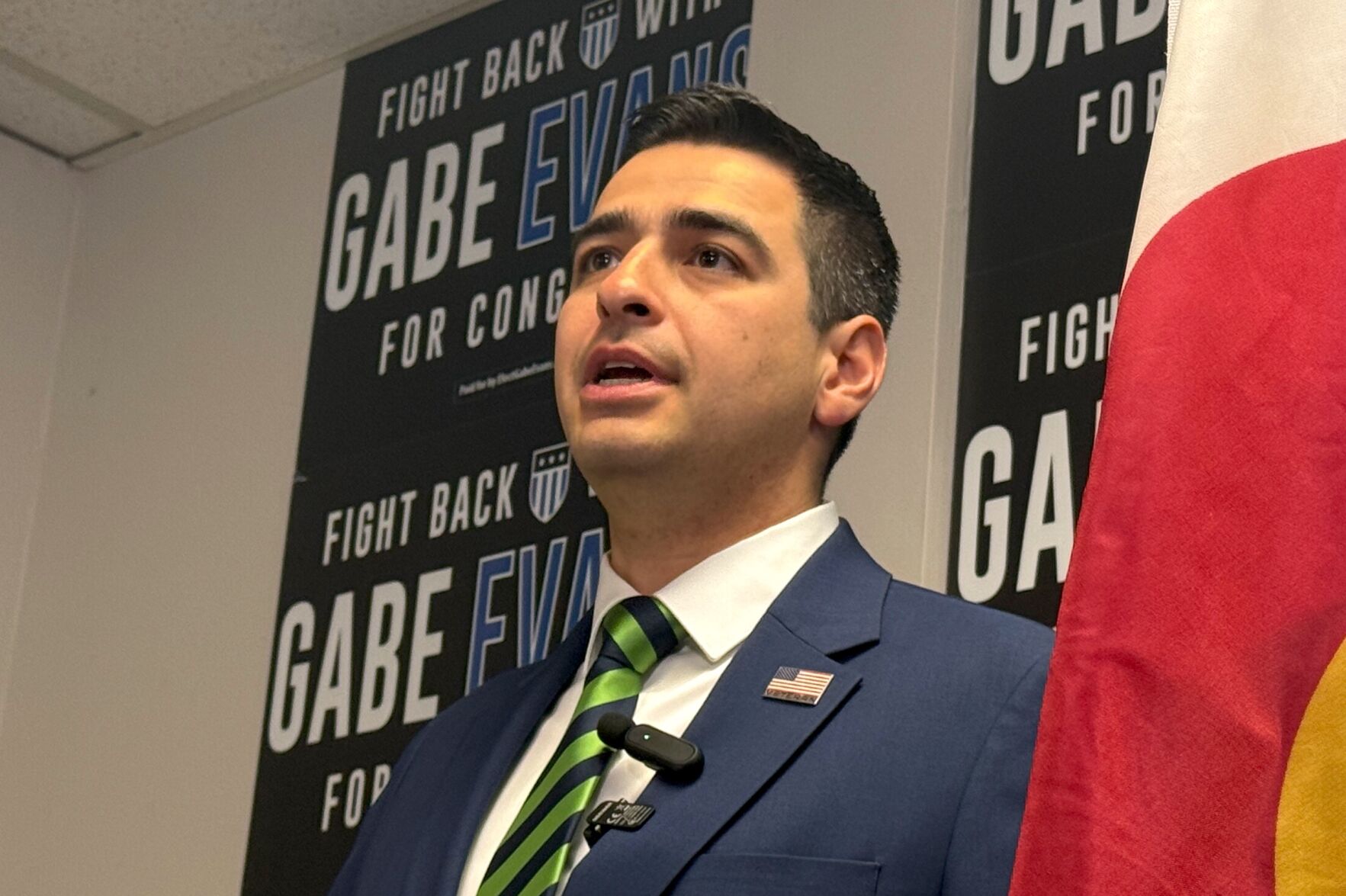Republican Gabe Evans makes history with razor-thin win in Colorado’s battleground 8th CD | TRAIL MIX
Colorado Republican Gabe Evans accomplished something rare last week when he unseated the congressional incumbent in the state’s newest district, flipping the seat two years after its creation while putting the GOP one member closer to keeping its slim majority in the House of Representatives.
When all the votes were counted, the first-term state lawmaker from Fort Lupton, an Army veteran and former police officer, barely edged past Democrat Yadira Caraveo, a pediatrician and former legislator from Thornton, in a race that drew intense national attention and attracted more outside spending than any other Colorado congressional district contest ever has — nearly $30 million, according to the Center for Responsive Politics, compared to about $19 million spent last cycle in the same district.
The state’s only undisputed toss-up seat, the 8th Congressional District — covering portions of the Front Range north of Denver, from Adams County suburbs to Greeley in Weld County — was drawn by Colorado’s Independent Redistricting Commission to be a battleground, and its voters haven’t disappointed.
For the second election running, the district’s representatives earned their ticket to Washington by almost the same razor-thin margins — 0.69 percentage points for Caraveo’s 2022 win, followed by Evans’ 0.74 percentage point advantage this year, according to final, unofficial results posted late on Nov. 14.
It marks the first time in decades that a Colorado congressional race has been decided by less than a single percentage point margin in two consecutive elections.
This time, Evans managed to clear his leading opponent, Caraveo, by 2,448 votes, which seems like a luxurious lead compared to the 1,632 votes Caraveo finished ahead of Republican Barb Kirkmeyer, the state senator from Brighton, in 2022. Their cushions amount to nearly the same margin, however, because turnout was up by almost 100,000 ballots in the 2024 presidential year, compared to last cycle’s midterms, rising from 236,402 to 333,600 votes cast, respectively.
Also remarkably, the third-party candidates on the ballot this year — Approval Voting Party nominee Chris Beam and the Unity Party’s Susan Patricia Hall — amassed close to the same share of the vote between them as Libertarian Richard Ward got by himself two years ago, with Baum and Ward’s votes totaling 2.82% to Ward’s 3.93%.
A few days after Labor Day, Evans won an endorsement from this year’s Libertarian nominee, Eric Joss, who withdrew from the race and threw his support behind the Republican after securing Evans’ signature on a pledge to abide by about a dozen principles the two agreed would “advance liberty” at the national level.
The agreement was the result of negotiations a year earlier between the respective chairs of the state GOP and Colorado Libertarians, in an attempt to prevent the minor party’s candidates from spoiling close races by siphoning votes from Republicans. The unprecedented deal appears to have worked in the 8th CD race and in a couple of state House seats Republicans also won by a whisker.
“That’s an example of how we have focused so heavily on trying to pull together coalitions, focusing on what unites us rather than what divides us,” Evans said at a press conference on Nov. 11 at his campaign headquarters held the morning after Caraveo called him to concede. “I was truly honored to be able to work with (the Libertarians) and work with the pro-liberty community, to be able to put together this coalition that I truly think was instrumental in getting us across the finish line and flipping this district.”
With his win, Evans joined the select club of Colorado candidates who have defeated incumbent members of Congress, numbering just seven since the turn of the century, including Evans — though one of his’ fellow Republicans accomplished the feat twice, first ousting a House member and then deposing a sitting U.S. senator.
That was Cory Gardner, who denied Democratic U.S. Rep. Betsy Markey a second term in 2010 in the 4th Congressional District and then four years later did the same to Democratic U.S. Sen. Mark Udall. Markey, for her part, won her first time by defeating Republican U.S. Rep. Marilyn Musgrave, and Gardner met the same fate in 2020, when Democrat John Hickenlooper derailed the Republican’s plans for a second Senate term.
“This is probably one of the, if not the biggest races in Colorado since 2014,” boasted Evans at his press conference, comparing his triumph to Gardner flipping the Senate seat.
The other Coloradans who short-circuited congressional incumbents’ plans to return to DC since 2000 were Republican Scott Tipton, who beat three-term Democratic U.S. Rep. John Salazar in 2010 in the 3rd Congressional District; Democrat Jason Crow, who dethroned five-term Republican U.S. Rep. Mike Coffman in 2018 in the 6th Congressional District; and, Republican Lauren Boebert, who toppled Tipton in the 2020 GOP primary.
In the blink of an eye, almost exactly three days after polls closed, Evans went from being a potential footnote in Colorado political history to the state’s breakout star of the 2024 cycle.
At 6:20 p.m. on the Friday after the election, a ballot update from Weld County turned the race in Evans’ favor, switching from Caraveo’s 1,311-vote edge to a 2,529-vote advantage for Evans. Up to that point, Caraveo had held onto the lead she took early on election night, when county clerks posted the second batch of results, but once she relinquished it, Evans stayed ahead by roughly the same margin through final returns.
Discussing his squeaker of a win, Evans acknowledged that he’ll likely face the same competitive, years-long bid for reelection that greeted Caraveo soon after she took office.
“To me, the fact that this is a very narrowly — it’s one of the swing districts across the country — that means that you’re just going to have to put in double-time effort to represent your district, and that’s, quite honestly, what the job description is,” Evans said. “Your job is to know this district, to talk to talk to (constituents), to speak to them, to listen to them, to be able to carry their issues to the forefront of the conversation, and be able to advocate for those things that are going to make their lives better.”
Ernest Luning has covered politics for Colorado Politics and its predecessor publication, The Colorado Statesman, since 2009. He’s analyzed the exploits, foibles and history of state campaigns and politicians since 2018 in the weekly Trail Mix column.











